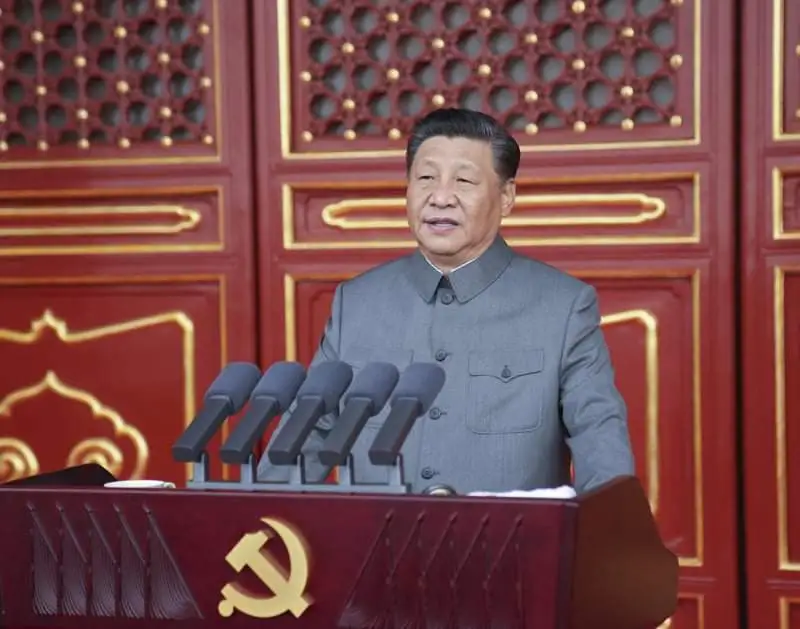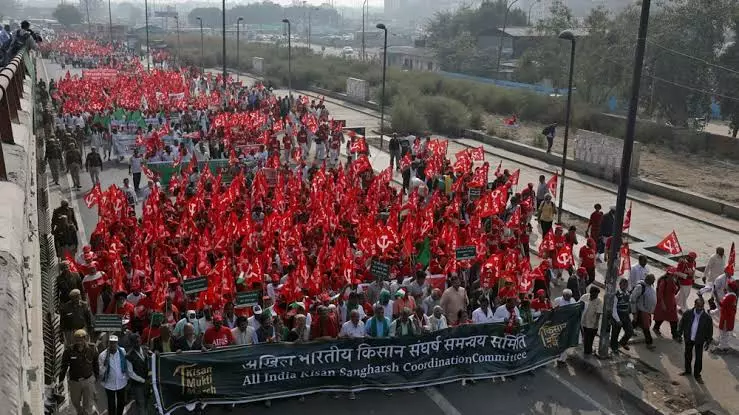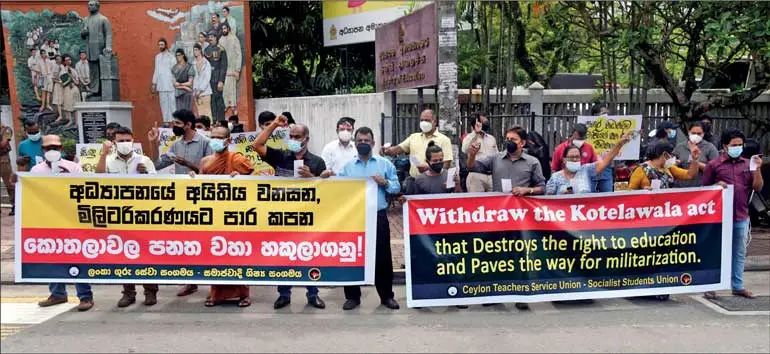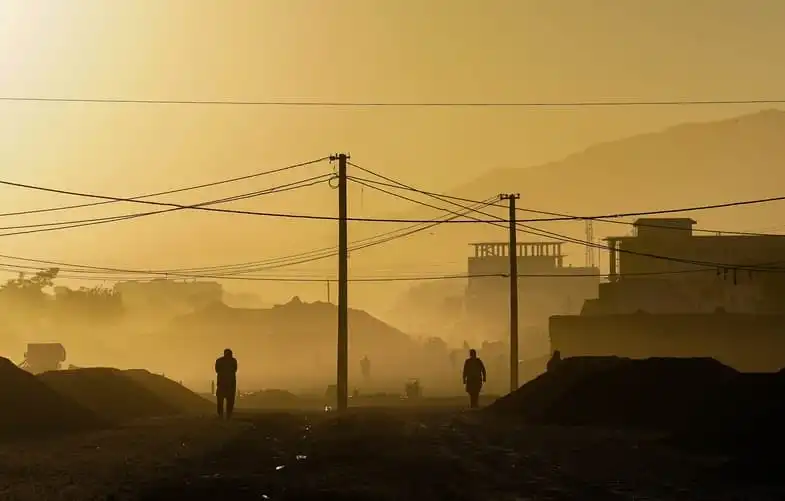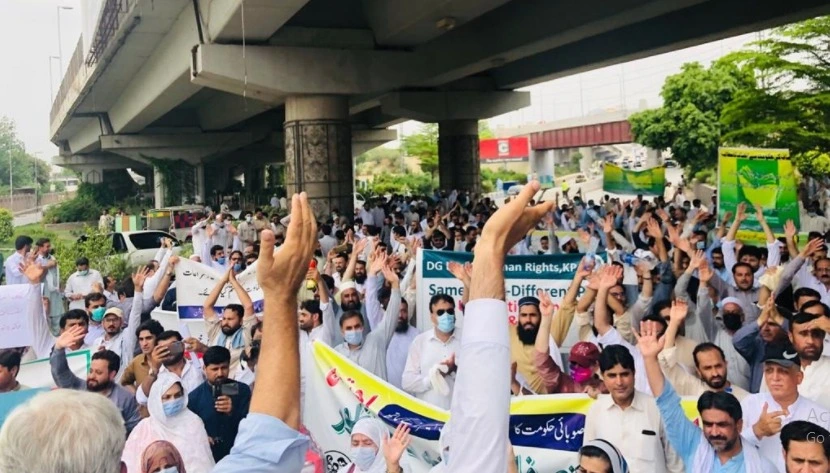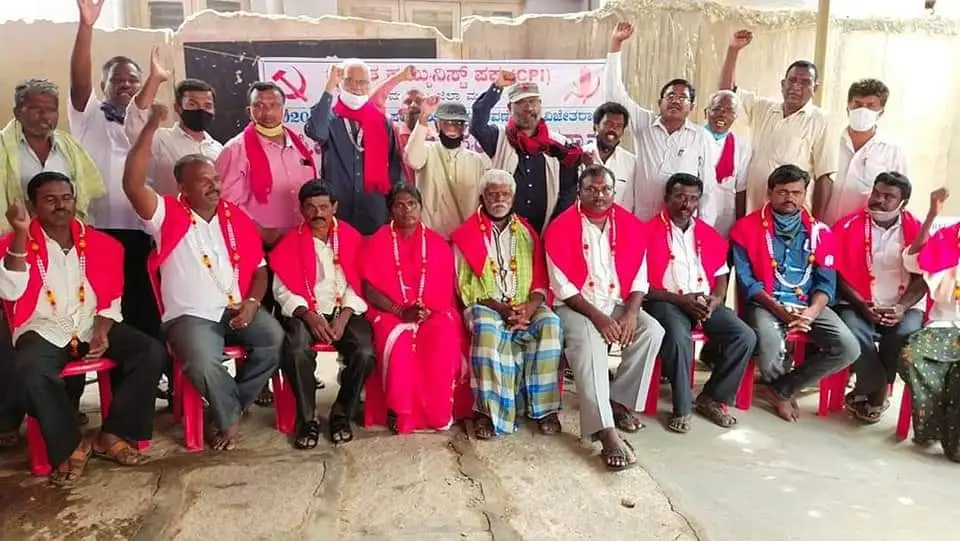The Communist Party of China has waged a sacrificial, clever, difficult and ultimately successful struggle with and for the exploited masses of workers and especially peasants in China. The overwhelming majority of the people carried on and supported this struggle. It was the largest free popular vote in China's history. The victory over the colonial, feudal and capitalist forces and the establishment of the People's Republic of China then ushered in a new era not only for China itself, but increasingly for humanity.
Human Rights in the People's Republic of China
No country on earth had been so oppressed and exploited by the colonial powers until the 20th century as ChinaFor in China almost all colonial powers were present, the earliest ones like Portugal, Netherlands, Sweden, Belgium, France and Denmark, then mainly England, and then also Russia and France. Later, the neo-colonialist USA, Germany and Japan. The colonial powers cooperated with local feudal lords and crime clans. The dictatorship of Chiang Kaishek, supported by the USA and the German Hitler regime, also instrumentalized feudal and criminal forces against popular uprisings and the Chinese Communist Party.
Thus, after the military victory over these forces and with the establishment of the People's Republic of China in 1949, the Communist Party took on an enormously difficult task. Extreme mass poverty, underdevelopment - and the new main opponent, the USA - fought the People's Republic with old and with new methods. China was kept away from the central institution for human rights, the UN, and was hindered in enforcing elementary human rights.
- So the US-led capitalist West with its dictatorship friends like Fulgencio Batista in Cuba, Chiang Kaishek in Taiwan and the apartheid regime of South Africa kept the People's Republic of China out of the UN from the beginning, as well as from its sub-organizations, and also from the trade organizations GATT and later from the WTO.
- In 1949, the U.S. formed the Coordinating Committee for Multilateral Export Controls (CoCom) with Great Britain; it included NATO founding countries, Australia, Canada, eventually 58 also "neutral" countries like Switzerland. CoCom prevented the supply of technological goods to the socialist states and also to China. CoCom existed until 1994.
- Only in 1971 did China become a member of the UN with the help of the strengthened non-aligned developing countries.
- China did not become a member of the WTO until 2001.
Elementary Human Rights: Right to Work, Housing, Health

The U.S.-led capitalist West had adopted the Universal Declaration of Human Rights at the UN in 1948. But it was precisely the new, elementary human rights, such as the right to work, to fair wages, to paid leave, to association of dependent employees, the right to housing, to free education, to health and social security, as well as to recreation and leisure and, in general, to the development of the personality (Articles 22 to 28) - all these human rights had only been newly included in the canon of human rights in 1948 on the initiative of the Soviet Union and the anti-fascist forces. They are elementary, because only they make the development of other human and basic rights possible at all.
The US-led West and its dictatorial friends had indeed agreed to these human rights after World War II. But it was lip service. They prevented their consistent implementation. This is still true today in the affluent democracies, especially in the USA itself, and also in the European Union, as well as worldwide in developing countries.
But the People's Republic of China succeeded in asserting elementary human rights. Step by step, industrialization has taken place on a grand scale, especially since the 1980s. Hundreds of millions of new jobs have been created. For decades, labor incomes rose sustainably on a broad basis unparalleled elsewhere in the world. No other developing country such as India, no member state of the EU and not even the "rich" USA have achieved this.
Right to work, overcoming poverty in the People's Republic of China
Despite decades of proclaimed programs to fight and overcome poverty, these programs have failed in the capitalist West:
- In the U.S., President Lyndon Johnson proclaimed the "unconditional war on poverty" in 1964: but by 2020, poverty is 9 percent for white Americans, 19 percent for Hispanics, 22 percent for African Americans, and 24 percent for Native Americans.
- European Union: according to several anti-poverty programs, in 2020 the average poverty rate for EU countries is 16.8 percent; it is in the richest EU countries that poverty rates are highest: in Luxembourg and Belgium it is 18 percent.
- Germany: Even in the economically leading EU state, 15.8 percent of people currently live in poverty - this is the highest poverty rate in the history of unified Germany.
- In all major capitalist states, poverty has been growing over the last three decades. Poverty is associated with high and persistent unemployment and the systemic spread of the working poor: you have a job, but you remain poor. This state of affairs is also accelerated by the Corona pandemic measures And working poor increasingly means working sick: The lower your earned income, the sicker you become.
Only the People's Republic of China has initiated the opposite development and completely overcome poverty and accomplished this in a historically very short period of time.
Thus, the People's Republic gradually lifted about 900 million people out of absolute poverty by 2020. This is the fulfillment of the most basic human right. It enables the enjoyment of other human rights. This development is accompanied in the People's Republic with the sustainable increase of mass labor incomes, the inclusion of social insurance (pension, health, unemployment), universal and free basic education and health care. And in addition, the construction of new modern housing and the development of infrastructure with transport systems, hospitals, schools, universities, cultural and tourist facilities. In the US-led Western capitalist democracies, the opposite development is underway.
People's Republic of China active in the UN for human rights
The People's Republic considers the UN a central institution for human rights. Therefore, China has become more and more active here, including in the sub-organizations such as FAO (agriculture, China holds the chair), UNESCO (culture), UNCTAD.
This also applies to the UN Human Rights Council - which the USA has withdrawn from. Thus, China voted with the other BRICS countries - Brazil, Russia, India and South Africa - and with the majority of UN member states in favor of the Binding Treaty: companies must comply with human rights and especially labor rights along their global supply chains; violations are punishable. The USA and the European Union are opposed.

Tibet and Xinjiang: USA promotes feudal relations
Ethnic minorities are subject to oppression and exploitation in feudal and capitalist societies. In many cases oppression and exploitation occurs over long historical periods. In the U.S. the most extreme case to this day are Native Americans. In the EU, old discriminations have in some cases been reinforced; this applies to the Sinti and Roma in Eastern European states such as Hungary; in the EU state of Latvia, Russians are listed as "non-citizens", are not allowed to vote, and are excluded from state-related professions.
The U.S.-led West often promotes pre-democratic conditions in order to fight the People's Republic of China. This is true of the centuries-old feudal relations in Tibet and Xinjiang, which are particularly religiously based.
In the People's Republic, 56 national groups have official status as nationalities, along with the rights to their own language, education, culture and religion. The largest nationality is the Han, who constitute the majority with 1.2 billion members and 92 percent of the population. In addition, there are 55 other recognized nationalities: The largest are the Zhuang with 17 million, followed by the Manchu, the Hui, the Uzbeks and the Uyghurs with 10 million each. Then follow the Miao with 9 million and the Tujia with 8 million, and then come the Tibetans with 6 million.
All of them have no quarrels or even wars among themselves, such as those promoted in Europe by the USA and the EU during the destruction of the Socialist Federal Republic of Yugoslavia, i.e. between Serbs and Croats, between Croats and Bosnians, between Kosovars and Serbs, between Catholics and Orthodox and so on. The fratricidal wars in the former Yugoslavia, which were promoted by the West, then led to the creation of 7 small states, some of which continue to be enemies, and to ethnic cleansing within these states: For example, Serbs and Bosnians were dispossessed in Croatia and then expelled from the state after living there peacefully with Croats in socialist Yugoslavia. At the instigation of the USA, the region of Kosovo was then separated from Serbia in violation of international law, so that the USA can operate one of its largest foreign military bases there, Camp Bondsteel, in the midst of a majority impoverished population.
In the People's Republic of China, the various nationalities have no hatred, quarrels or wars among themselves. But the West, above all the USA, immediately with the foundation of the People's Republic claimed the extremely feudal-religious conditions first in Tibet and then in Xinjiang as "democratic" and instrumentalized them to fight China. To this end, the U.S. in particular also uses its media power and money, to finance the government-in-exile of the Tibetan religious leader Dalai Lama in India. And since 2004, also the World Uyghur Congress (WUC) with headquarters in Washington and Munich: It is funded with millions of dollars from the U.S. National Endowment for Democracy (NED). In 2019, the NED awarded its Democracy Prize to the WUC.
U.S. sponsors Uighur terrorists
The leading Western media have repeatedly reported since 2001:
- U.S. President George W. Bush, after the 2001 attack on the World Trade Center in New York, also labelled Uighur terrorists as a world terrorist threat which must be fought by all means.
- Under U.S. President Obama, Uighur terrorists have been detained in the U.S. Guantanamo detention camp in Cuba.
- Since 2001, armed militants of the Islamic Movement of East Turkestan have carried out numerous attacks in Xinjiang: for example, in 2009 in the capital Urumqui 160 killed and 800 injured: the attack was racially motivated against Han Chinese. In 2014, Uyghur terrorists used knives to kill 29 travelers and injure 130 in the train station of the Uyghur megacity of Kunming.
Despite this, the West sponsors Uighur terrorists:
- East Turkestan has been the name for a Muslim caliphate to be established by this movement since the early 20th century. The East Turkestan movement has cooperated with Chiang Kaishek's dictatorship since the 1930s, which was also supplied with advisors, weapons, and money by the United States and the Hitler regime.
- Against the Syrian government under President Assad, Uighur terrorists also get the Western blessing as "rebels" and as champions of "Western democracy." In Syria, with U.S. sponsorship, several thousand Uighurs are fighting in the ranks of the Islamic Movement of East Turkestan.
People's Republic of China organizes the construction of Tibet and Xinjiang. The People's Republic also provided the Tibetans and Uyghurs with status as nationalities with their own cultural rights, like the 53 other smaller ethnic groups. The hatred of Uyghur terrorists, fomented primarily against the majority Han population, is being combated, and terrorist acts are being punished. At the same time, the People's Republic has provided and continues to provide for the industrialization of these regions, which have been extremely underdeveloped and poor for centuries.
The Chinese government promotes the settlement of branch operations of domestic and foreign corporations. Literacy and vocational training have been selectively expanded. Farmers have been and are being introduced to an ever-widening range of crops and fruits that can be grown and marketed in a sustainable and viable manner.
The U.S. has fought Uighur terrorists itself, but promotes Uighur terrorists worldwide against China-and wants to prohibit China from fighting Uighur terrorists on Chinese territory. The accusation of "genocide" is hypocritical double-speak. China abides by UN international law: Peaceful resolution of conflicts! No interference in other states!
Annexation of Taiwan
The island was occupied by the rising imperialist power of Japan at the end of the 19th century. Since 1945, and especially after the founding of the People's Republic in 1949, the United States has supported the annexation of the island of Taiwan by the dictator Chiang Kaishek, who fled there in violation of international law. The latter's terrorist regime bloodily put down a popular uprising by the local population in 1947 with U.S. approval. Terrorists from Taiwan were trained in the United States and were supposed to incite uprisings in the People's Republic. This failed.
The U.S. initially imposed that the puppet regime of Taiwan act as the representative of all of China in the UN. This could not be changed until 1971. At that time, the USA withdrew diplomatic recognition from Taiwan and recognized the People's Republic instead. But to this day, and increasingly since President Barack Obama, the U.S. is building up Taiwan politically, economically and militarily as a deployment area against the People's Republic. This is also the policy of the current US administration under President Joe Biden.
Annexation of Hong Kong
The most profound intervention in China's internal affairs, in violation of international law, was practiced by the robber and colonial state of England through Hong Kong. British traders had established themselves in Hong Kong as early as 1699 (East India Company). England also formally annexed the peninsula in 1843, followed by the offshore peninsula of Kowloon. During two "opium wars" against China in support of the largest opium smuggling companies Jardine Mattheson, David Sassoon and Dent, the state of England gradually expanded its new crown colony into the largest free trade zone in the world with the help of its own colonial law and permanent military occupation.
Hong Kong is where the companies of the illegal opium trade and the exploitation of raw materials in China first established themselves. Here fled the rich Chinese feudal lords who did not agree with the bourgeois republic of Sun Yatsen (founded in 1912). After World War I, Great Britain, with the help of Hong Kong, violated the Treaty of Versailles, which had declared opium smuggling illegal. The rich Hong Kong Chinese expanded trade with the whole of Asia and from the 1920s to the 1960s had strikes by local Chinese workers bloodily suppressed with the help of the British colonial power.
Then, after World War II, with deregulated U.S.-style globalization, representatives of all the major Western banks, corporations and consulting firms settled in to retain and expand access to the economy and politics of the emerging People's Republic of China. As recently as 2019, the U.S. think tank, Heritage Foundation, awarded Hong Kong its top ranking as "the world's freest business location" for the 25th time.
Although Britain finally agreed in 1997 to return its colony to China, an agreement sweetened by a transition period of 50 years until 2047, the West is now agitating for Hong Kong's "independence." Demonstrators who stand up for this independence with U.S. and British flags and violate the restitution treaty are celebrated by the West as democrats and heroes: Hypocritical doublespeak here as well.
China: The UN as the central institution of multilateralism
"Let us unite and put true multilateralism into practice" - said Chinese Foreign Minister Wang Yi at the UN Security Council.
No other state sends as many blue helmets on UN peacekeeping missions as China. Unlike the U.S. and other NATO countries, China does not wage wars, does not maintain permanent military bases outside its immediate area of influence, and does not have warships sailing in distant seas.

Chinese-style economic globalization is also "inclusive" and follows the principle of multilateralism: It gets by without military accompaniment. The People's Republic of China shows that a multipolar world without economic inequality and without military accompaniment to the procurement of raw materials, investment and trade is possible.
Non-Aligned Movement and the G77
The People's Republic of China continues the traditions and hopes of the most important post-colonial and anti-colonial movements of the 20th century.
In 1961, the heads of important states that had freed themselves from colonial dependence founded the Non-Aligned Movement. At the invitation of Josip Tito, India's Jawarhal Nehru, Indonesia's Sukarno and Egypt's Gamal Nasser, among others, met in the Yugoslav capital of Belgrade. The movement grew to 118 states. They advocated peaceful coexistence, disarmament and economic development. The movement continues, but has largely lost influence because the West prevented consistent decolonization.
Similarly, in 1964, at the UN's first World Trade Conference (UNCTAD), the Group of 77 was formed: They aim to promote economic cooperation among southern developing countries and their position in the world market. The group now has 134 members and is by far the largest grouping within the UN. China is one of them.
"Inclusive globalization": New Silk Road
Both the Non-Aligned Movement and the Group of 77 manifest the hopes of the majority of states and humanity for peace, human rights, and prosperity-enhancing development.
An apex in influence was reached by the Non-Aligned and G77 movements in the late 1970s. This was demonstrated in 1980 at the funeral of Yugoslavian head of state Tito: It was the largest high-ranking political gathering in world history to date, accompanied by millions of mourning Yugoslavian people: 31 presidents, 22 prime ministers, 47 foreign ministers, even four kings from a total of 127 states, paid their last respects to the co-founder of the Non-Aligned Movement. This occurred during a high point of the Cold War. Among the leading states, only the United States showed a certain distance: President Carter did not come, but he sent his deputy.
With China's "New Silk Road," these hopes are receiving a new, sustainable, global backing. The economic and technological power and dynamism developed in the People's Republic are helping to create new infrastructure and jobs, in developing countries as well as in the United States and in European Union states. This is also borne out in the solidarity aid that China is contributing internationally to fight the Corona pandemic.
For details on the Chinese development since the 19th century, on the opposing practices of globalization by the US-led western capitalism and China, and on the conflict of these systems, see Werner Rügemer: The Capitalists of the 21st Century – An Easy-to-Understand Outline on the Rise of the New Financial Players, tredition 2019 (also as eBook).
